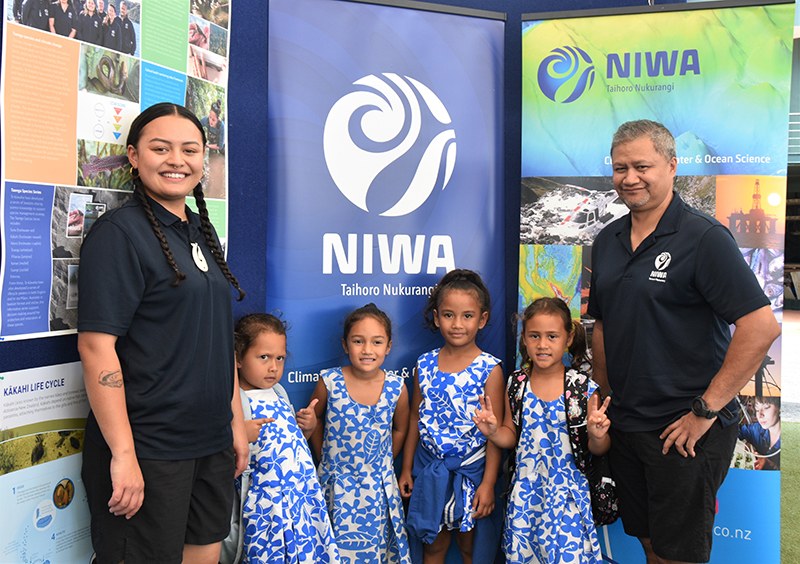Kiwi experts share knowledge at inaugural science expo
Friday 21 October 2022 | Written by Melina Etches | Published in Education, National

New Zealand’s National Institute of Water and Atmosphere (Niwa) staff Melanie Mayall-Nahi and Marino Tahi with Apii Te Uki Ou kids at this week’s Science Expo. 22101904
The National Institute of Water and Atmospheric Research (Niwa) in New Zealand, conducts research across a broad range of disciplines in the environmental sciences such as the oceans, climate, freshwater, rivers, lagoons, lakes and all the animals.
The Niwa team was one of the many international partners which featured at the inaugural Climate Change Prime Minister’s Science Expo.
The Expo held from Monday to Wednesday at the National Auditorium focused on increasing climate change awareness and encouraging students and local communities to learn about STEAM (Science, Technology, Engineering, Arts and Mathematics).
Niwa executive team member Marino Tahi said: “We are here to support the kaupapa and help open kids’ eyes to what science can do and where they might see themselves.”
In New Zealand, Niwa does a lot of work with their iwi partners especially around species such as tuna (freshwater eel), kōura (freshwater crayfish) and kākahi (freshwater mussels).
“We work with our indigenous communities to get the numbers back up because the numbers are low, and to get the numbers up, you have to understand their life cycle, how they travel, what they feed on, where they live and try and restore those environments,” said Tahi.
While eels are found in New Zealand’s rivers and lakes, Tahi explained their migration cycle where they travel to sea to spawn, and once they have their babies, they return to the freshwater where they live as adults.
Niwa also employs Māori research teams. Interns work across Niwa for 12 months gaining practical experience in Māori environmental research, building networks’ and discovering longer-term career opportunities in research.
At this week’s Expo, Te Kūwaha – Māori Environmental Research team’s Tekiteora Rolleston-Gabel and Melanie Mayall-Nahi helped out answering questions and giving advice to students.
Tahi said they are learning more about the Cook Islands and have been meeting with government ministries here to help set up systems, including the Meteorological Office with technology to help predict the weather.
Niwa was established in 1992, and operates with its own board of directors and executive.
Also featured at the Expo were Manaaki Whenua (Landcare Research NZ), University of Auckland, University of Waikato, Otago Museum, which exhibited the popular StarLab – an inflatable planetarium dome and lab in a box, University of New South Wales, and Brigham Young University - Hawaii. Local partners include Ministry of Education, Office of the Public Service Commissioner, Infrastructure Cook Islands, Ministry of Marine Resources, Cook Islands Investment Corporation, Korero O'te Orau, Gallery Tavioni and the Cook Islands Voyaging Society.
The theme of the Expo was “The Synergy of Traditional Knowledge and Science - Keeping it Cool”.












































